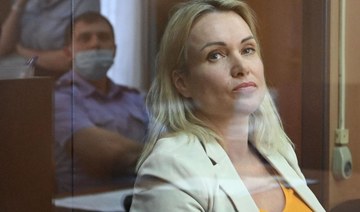BEIJING: If you can make smartphone apps, Chinese tech giant Huawei wants you.
The No. 2 global smartphone brand is struggling to hold onto its market after Washington accused Huawei of being a security risk and blocked access to US components and technology.
That includes YouTube and other popular Google “core apps” customers expect on new phones. They will be missing from the global rollout of Huawei’s next model, the P40, due out in March, replaced by its own music, payment and other apps.
Huawei Technologies Ltd., along with every other smartphone brand except Apple Inc., relies on Google’s Android operating system. So it’s scouring the world for replacements. At events for developers from New Delhi to Warsaw to Sao Paulo, Huawei is promising cash rewards if they meet a deadline Friday to get apps onto its online store.
The company says it will invest $1.5 billion in app development. It faces an expensive, uphill struggle to create alternatives to the Google-centered world of music, navigation and other apps, according to industry experts. Others including Nokia and Microsoft have tried and failed to create their own mobile ecosystems.
Creating “diverse apps” is a “really challenging task to Huawei,” said chairman Guo Ping in videotaped comments released by the company.
Huawei, also the world’s biggest maker of switching gear for phone networks, rejects US accusations it might facilitate Chinese spying. Chinese officials accuse Washington of using phony security claims to hurt a commercial rival.
The Trump administration also is pressing European and other allies to exclude Huawei switching gear from next-generation telecom networks.
The conflict has fed fears technology industries might split into Chinese, US and other spheres with incompatible products.
Huawei’s founder, Ren Zhengfei, has said it wants to stay in a unified global industry and work with Google and other US partners.
The Android system is open-source, meaning phone brands use it for free but most also pay Google for “core apps” and the software to support them.
Huawei can keep using Android but is blocked from buying those “core apps” for pre-installation. That threatens to cripple Huawei’s ability to compete with market leader Samsung and other Android-based phones.
Consumers expect “well-known apps that their peers are using,” such as Google Maps, said Thomas Husson, a principal analyst for Forrester, in an email. “It would require massive investment to convince developers to develop for a new eco-system and a lot of marketing efforts.”
Huawei already sells phones without Google “core apps” in China, where the ruling Communist Party’s Internet filters block access to YouTube, the Google search engine and thousands of other foreign websites. Instead, Huawei phones come with Chinese search engine Baidu.com, video service Youku.com and other local apps.
But Huawei competes on a level playing field in China with competitors that face the same restrictions. In other foreign markets the others have the popular Google package.
For the P40, Huawei has signed an agreement for developers to use maps from a Dutch provider, TomTom. Details of other services have yet to be announced.
In response to questions, Huawei said executives would talk to reporters next month at the Mobile World Congress, the industry’s biggest annual event. The chief executive of Huawei’s consumer unit, Richard Yu, told reporters in December the P40 would be launched in Paris in late March, using Android instead of Huawei’s HarmonyOS operating system, which it unveiled last year.
HarmonyOS is based on code developed for other Huawei devices and could replace Android if needed. But the company wants to keep working with Google, which has spent more than a decade improving Android with input from Huawei and other companies.
Replacing Google apps is “a massive undertaking for any company,” said Dermot Daly, chief executive of Tapadoo, an Irish app developer that isn’t working for Huawei.
Huawei Mobile Services offers some 45,000 apps. But that is barely 1.5% of the 3 million titles on Google Play Store, where most Android users get apps.
Huawei needs to replace Google code that supports video and other features, said Daly. Then it needs to persuade developers to adapt apps to run on Huawei’s new code.
“They’re not building from scratch, but they face a big technical hurdle,” said Daly. “Becoming a world-class software maker is a massive challenge.”
Nokia Corp. took a similar approach with its first smartphone a decade ago but failed to attract enough apps for its system, said Daly. He said Microsoft Corp. tried again after acquiring Nokia’s mobile phone unit in 2013 but faced similar lack of developer interest.
Such difficulties highlight the dominance of US app providers and the very gradual emergence of global alternatives.
For music, Sweden’s Spotify or France’s Deezer may come preloaded on phones, depending on deals with local phone carriers, said Forrester’s Husson. Other options include China’s TikTok for video, Russia’s Yandex for search and email or OsmAnd and MapQuest for navigation, though none is as highly developed as Google or Apple services.
The search goes on: At an event in New Delhi, Huawei promised $20,000 per app for development costs, according to the newspaper Economic Times.
In London, the website Telecom.com said developers were promised a 20,000 pound ($26,000) reward if they meet a Jan. 31 deadline. A video released by Huawei said the company has set aside $10 million to subsidize app writers in Poland.
Huawei says its 2019 sales rose 18% to $122 billion. But it warned the smartphone business, which shipped 240 million handsets last year in 170 countries, could suffer.
The Trump administration has postponed full enforcement of sanctions after US processor chip makers and other vendors warned they would lose billions of dollars in sales. But Ren, the company founder, has said Huawei expects them to go ahead.
Huawei has one of the world’s biggest research-and-development budgets and ramped up spending on developing its own chips and other technology long before running afoul of Washington.
It spent more than $15 billion last year — more than Apple or Microsoft — and a total of 485 billion yuan ($65 billion) over the decade before that. Industry analysts say the company is increasingly self-sufficient in chips and other components.
Huawei has yet to confirm details of the P40, but news reports suggest it will run on the company’s Kirin 990 chip instead of one from Qualcomm or Intel. That reduces risks of supply disruptions.
“We will become more open and work with our partners around the world to develop secure, sustainable and thriving eco-systems,” said Guo, its chairman.
At the same time, Huawei is trying to persuade Canada to release its chief financial officer. She is being held in Vancouver on US charges related to possible violation of trade sanctions on Iran.
Ren, who founded Huawei in 1987, expresses confidence it can withstand US pressure.
“The United States might further escalate their campaign against Huawei, but I feel the impact on Huawei’s business won’t be very significant,” Ren said during an appearance at the World Economic Forum in Switzerland. “I think we are more confident that we can survive further attacks.”
Huawei races to replace Google apps for next smartphone
https://arab.news/m9msj
Huawei races to replace Google apps for next smartphone
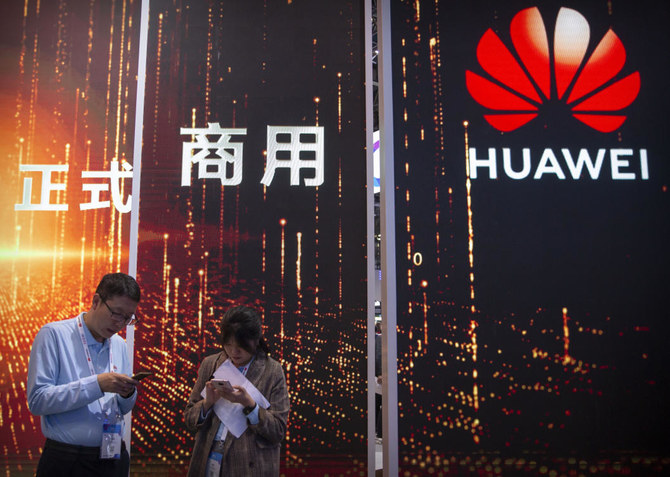
Humanity at a turning point, Saudi minister tells WEF meeting in Riyadh
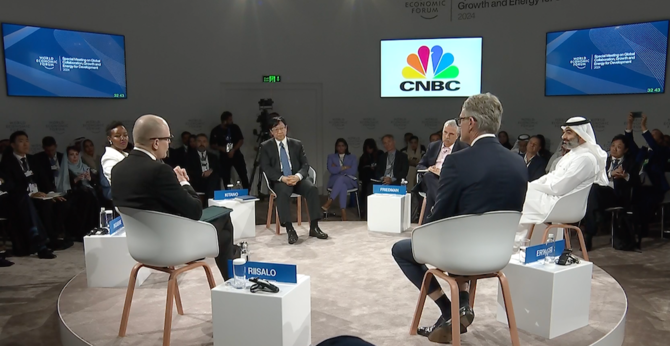
- Saudi Arabia wants to lead ‘intelligence revolution,’ Abdullah Al-Swaha, communications and information technology minister, says
- Industry leaders ‘must master AI within years or face irrelevance’
RIYADH: Humanity is at a turning point, pivoting from digital to artificial intelligence, and shifting from the industrial revolution to the intelligence revolution, a senior Saudi official told the special two-day World Economic Forum meeting in Riyadh.
“The world today is not at a tipping point but at a turning point in humanity, which means weare pivoting from digital to AI and maybe later on quantum,” Abdullah Al-Swaha, minister of communications and information technology, said.
Saudi Arabia is ready to embrace that shift, he added.
“The Kingdom is excited with its partnerships with countries and international organizations to carve a path toward inclusive AI adoption,” Al-Swaha told the panel.
“We are pushing today an inclusive agenda, that is innovative, and indisputably multistakeholder to make sure that we lead and leapfrog in this era.”
The Saudi minister noted that global economic output today is worth $100 trillion, of which $32 trillion is attributed to the labor force, and $1 trillion of that ‘is being augmented, accelerated and democratized by generated AI.’
“Over the next five to seven years, it is projected to go to 40 percent. That’s 43 percent of the labor force productivity. And this is why we are pivoting toward intelligence revolution,” Al-Swaha said.
He also cautioned that if “talents and leaders” did not master AI within six or seven years, “they will become irrelevant for any industry they are in.”
‘Saudi Arabia at forefront of AI,’ says business leader at World Economic Forum
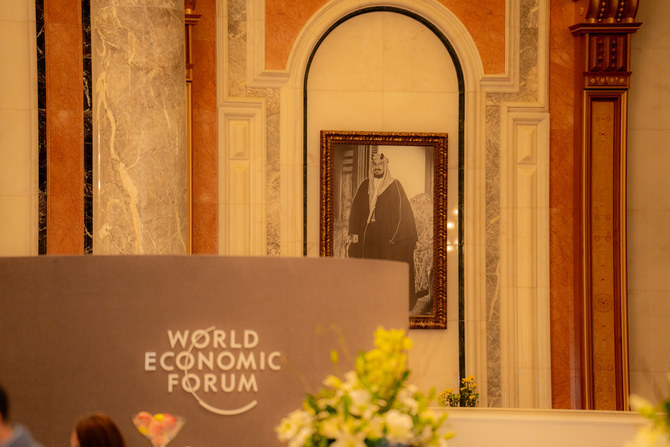
- Saudi Arabia 'really a driver of not only the economy of the region, but also the economy of the world,' says global vice chair and chair of Europe, MENA at consulting firm AlixPartners
RIYADH: Saudi Arabia’s role in technology advancement is helping to drive not only the regional but also the global economy, business leaders told Arab News at the World Economic Forum special meeting in Riyadh on Sunday.
The Kingdom has been “at the forefront” on artificial intelligence, Stefano Aversa, global vice chair and chair of Europe, the Middle and North Africa at consulting firm AlixPartners, said.
While the war in Gaza and broader Middle East tensions are expected to get top billing at the WEF Special Meeting on Global Collaboration, Growth and Energy for Development, technology’s role as a driver of change is also expected to be a major talking point.
Around 1,000 leaders from 92 countries have gathered in Riyadh for the two-day forum.
Saudi Arabia is “really a driver of not only the economy of the region, but also the economy of the world,” Aversa said.
“There are a lot of investors interested, and so it is important to stay close to some of the giga-projects here that will drive not only the growth of the Kingdom, but also the growth of some entire sectors, like energy transition.”
He said that the Kingdom’s move from “an early stage of development to more mature selective investment” is also important.
AlixPartners CEO Simon Freakley said that disruption is a looming issue for global industries ranging from automotive and aerospace to retail.
He defined disruption as “displacement of businesses, markets, and value networks as a result of economic, societal, environmental, political, regulatory, or technological changes.”
Freakley told Arab News that shipping routes, for example, faced disruption because of tensions in the Red Sea.
“Problems are caused by conflicts around the world or other challenges. What we’re finding is some of these themes go cross-industry, not just within industry.”
AlixPartners has 26 offices in 14 countries. Its fifth annual Disruption Index, based on a survey of 3,100 senior executives around the world, showed that 61 percent of CEOs worry they will be unable to keep pace with changing business cycles.
Freakley said: “This disruption work that we now do every year has become a sort of a touchstone of how we help people understand what the best companies, the best leaders, are doing.”
The consulting firm has predicted AI will become the single biggest driver of change across industries, not only as a defense against competitors, but also as a tool to enhance go-to market strategies.
“The people that are winning are the people that have the best data, and weaponize their data to actually get a competitive advantage. How people are using AI and the insight from their data to drive their growth is where we see the real opportunity,” Freakley said.
Two Russian journalists jailed on ‘extremism’ charges for alleged work for Navalny group
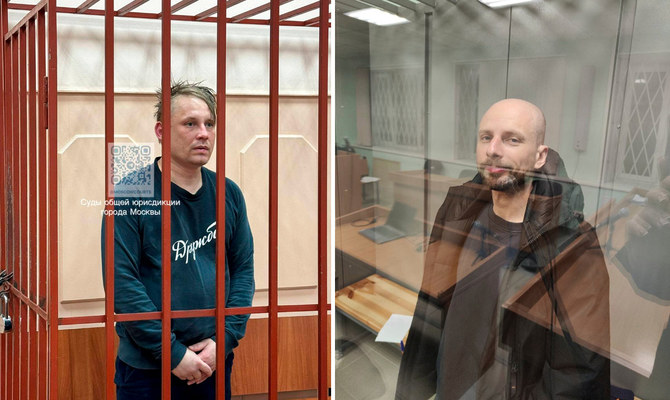
- Konstantin Gabov and Sergey Karelin both denied the charges for which they will be detained for a minimum of two months before any trials begin
- Russia’s crackdown is aimed at opposition figures, journalists, activists, members of the LGBTQ+ community, and other dissenters
LONDON: Two Russian journalists were arrested by their government on “extremism” charges and ordered by courts there on Saturday to remain in custody pending investigation and trial on accusations of working for a group founded by the late Russian opposition politician Alexei Navalny.
Konstantin Gabov and Sergey Karelin both denied the charges for which they will be detained for a minimum of two months before any trials begin. Each faces a minimum of two years in prison and a maximum of six years for alleged “participation in an extremist organization,” according to Russian courts.
They are just the latest journalists arrested amid a Russian government crackdown on dissent and independent media that intensified after its full-scale invasion of Ukraine more than two years ago. The Russian government passed laws criminalizing what it deems false information about the military, or statements seen as discrediting the military, effectively outlawing any criticism of the war in Ukraine or speech that deviates from the official narrative.
A journalist for the Russian edition of Forbes magazine, Sergei Mingazov, was detained on charges of spreading false information about the Russian military, his lawyer said Friday.
Gabov and Karelin are accused of preparing materials for a YouTube channel run by Navalny’s Foundation for Fighting Corruption, which has been outlawed by Russian authorities. Navalny died in an Arctic penal colony in February.
Gabov, who was detained in Moscow, is a freelance producer who has worked for multiple organizations, including Reuters, the court press service said. Reuters did not immediately comment on the ruling by the court.
Karelin, who has dual citizenship with Israel, was detained Friday night in Russia’s northern Murmansk region.
Karelin, 41, has worked for a number of outlets, including for The Associated Press. He was a cameraman for German media outlet Deutsche Welle until the Kremlin banned the outlet from operating in Russia in February 2022.
“The Associated Press is very concerned by the detention of Russian video journalist Sergey Karelin,” the AP said in a statement. “We are seeking additional information.”
Russia’s crackdown on dissent is aimed at opposition figures, journalists, activists, members of the LGBTQ+ community, and ordinary Russians critical of the Kremlin. A number of journalists have been jailed in relation to their coverage of Navalny, including Antonina Favorskaya, who remains in pre-trial detention at least until May 28 following a hearing last month.
Favorskaya was detained and accused by Russian authorities of taking part in an “extremist organization” by posting on the social media platforms of Navalny’s Foundation. She covered Navalny’s court hearings for years and filmed the last video of Navalny before he died in the penal colony.
Kira Yarmysh, Navalny’s spokeswoman, said that Favorskaya did not publish anything on the Foundation’s platforms and suggested that Russian authorities have targeted her because she was doing her job as a journalist.
Evan Gershkovich, a 32-year-old American reporter for The Wall Street Journal, is awaiting trial on espionage charges at Moscow’s notorious Lefortovo Prison. Both Gershkovich and his employer have vehemently denied the charges.
Gershkovich was detained in March 2023 while on a reporting trip and has spent over a year in jail; authorities have not detailed what, if any, evidence they have to support the espionage charges.
The US government has declared Gershkovich wrongfully detained, with officials accusing Moscow of using the journalist as a pawn for political ends.
The Russian government has also cracked down on opposition figures. One prominent activist, Vladimir Kara-Murza was sentenced to 25 years.
US State Department Arabic spokesperson resigns in opposition to Gaza policy
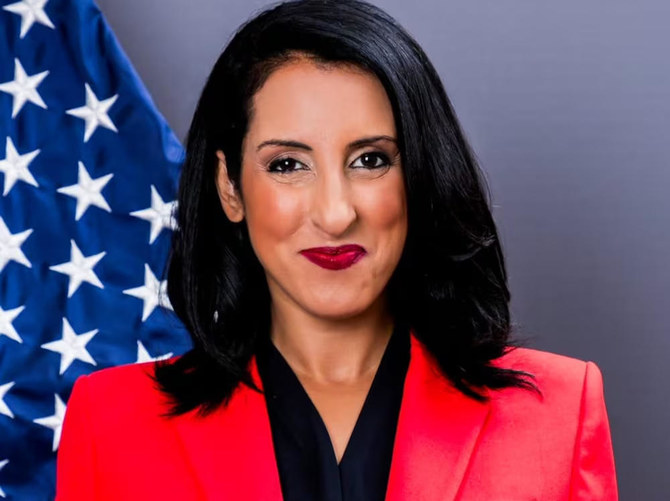
- Hala Rharrit is at least the third person to resign from the department over the issue
WASHINGTON: The Arabic language spokesperson of the US State Department has resigned, citing her opposition to Washington’s policy related to the war in Gaza, in at least the third resignation from the department over the issue.
Hala Rharrit was also the Dubai Regional Media Hub’s deputy director and joined the State Department almost two decades ago as a political and human rights officer, the department’s website showed.
“I resigned April 2024 after 18 years of distinguished service in opposition to the United States’ Gaza policy,” she wrote on social media website LinkedIn. A State Department spokesperson, asked about the resignation in Thursday’s press briefing, said the department has channels for its workforce to share views when it disagrees with government policies.
Nearly a month earlier, Annelle Sheline of the State Department’s human rights bureau announced her resignation, and State Department official Josh Paul resigned in October.
A senior official in the US Education Department, Tariq Habash, who is Palestinian-American, had stepped down in January.
The United States has come under mounting criticism internationally and from human rights groups over its support for Israel amid Israel’s ongoing assault in Gaza that has killed tens of thousands and caused a humanitarian crisis.
There have been reports of signs of dissent in the administration of President Joe Biden as deaths continue to grow in the war.
In November, more than 1,000 officials in the US Agency for International Development (USAID), part of the State Department, signed an open letter calling for an immediate ceasefire. Cables criticizing the administration’s policy have also been filed with the State Department’s internal “dissent channel.”
The war has also caused intense discourse and anti-war demonstrations across the United States, Israel’s most important ally.
Palestinian Islamist group Hamas attacked Israel on Oct. 7, killing 1,200 people, according to Israeli tallies. Israel has killed over 34,000 people in Hamas-governed Gaza, according to Gaza’s health ministry, leading to widespread displacement, hunger and genocide allegations that Israel denies.
Burkina Faso suspends BBC, VOA radio broadcasts over killings coverage
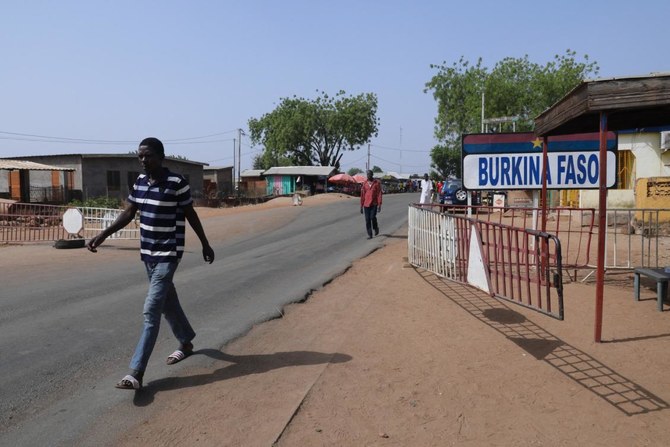
- Authorities handed two-week suspension for covering of report accusing the army of extrajudicial killings
- Human Rights Watch report says military executed about 223 villagers, including at least 56 children
LONDON: Burkina Faso has suspended the radio broadcasts of BBC Africa and the US-funded Voice of America (VOA) for two weeks over their coverage of a Human Rights Watch (HRW) report accusing the army of extrajudicial killings, authorities said late on Thursday.
In the report based on its own investigation, the rights watchdog said the West African country’s military summarily executed about 223 villagers, including at least 56 children, in February as part of a campaign against civilians accused of collaborating with jihadist militants.
HRW said the Burkinabe army has repeatedly committed mass atrocities against civilians in the name of fighting terrorism, and it called on authorities to investigate the massacres.
The country’s communication council said HRW’s report contained “peremptory and tendentious” declarations against the army likely to create public disorder and it would suspend the programs of the broadcasters over their coverage of the story.
Authorities also said in a statement they had ordered Internet service providers to suspend access to the websites and other digital platforms of the BBC, VOA and Human Rights Watch from Burkina Faso.
“VOA stands by its reporting about Burkina Faso and intends to continue to fully and fairly cover events in that country,” Acting VOA Director John Lippman said in a statement.
“The Voice of America strictly adheres to the principles of accurate, balanced and comprehensive journalism, therefore, we ask the government of Burkina Faso to reconsider this troubling decision.”
HRW conducted its investigation after a regional prosecutor said in March that about 170 people were executed by unidentified assailants during attacks on the villages of Komsilga, Nodin and Soro.
Burkina Faso is one of several Sahel nations that have been struggling to contain Islamist insurgencies linked to Al-Qaeda and Islamic State that have spread from neighboring Mali since 2012, killing thousands and displacing millions.
Frustrations over authorities’ failure to protect civilians have contributed to two coups in Mali, two in Burkina Faso and one in Niger since 2020.






